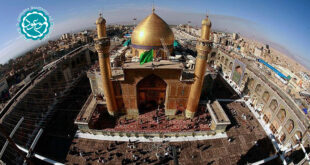Notes:
16. – Sūrah Rūm 30:30. (The Qur’anic translations in this book are derived from the Arbery translation of the Holy Qur’an.)
17. – Sūrah A‘rāf 7:172.
18. – The verse of Mīthāq has an immensely profound content and thus exegetes have interpreted it differently: Some believe it means that before creation of the natural world, God gathered all humans in another world—the world of Dharr—where He exposed His Lordship unto them. According to another interpretation, this verse speaks symbolically and states the fact that all humans, in the essences of their beings, possess a sort of personal—not general—and inherent—not acquired—awareness of God.
19. – Sūrah ‘Ankabūt 29:65; also see: Sūrah Luqmān 31:32, and Sūrah Naḥl 16:53-54.
20. – Kulaīnī, Uṣūl-e Kāfī, vol 1, p. 13.
21. – By calling this method experiential, we do not mean that it is free of all rational reasoning; rather, we mean that one of the basic rudiments of this method is observation of natural phenomena.
22. – Because the “argumentation of order” has been extensively discussed in previous textbooks we will refrain from discussing this argument.
23. – It must be said that there are several opinions regarding the interpretation of evidential understanding [shenākht-e Āyeh’ī] which have been derived from the Holy Qur’an. Some regard it as a preliminary to forming a rational argument—similar to what was said in explanation of the argumentation of order—concerning the existence of God and His Knowledge and Wisdom. According to another interpretation, the Qur’anic verses that call upon humans to contemplate natural phenomena, merely remind us of our innate understanding of God and have no significance other than notification and expunging neglect. The third opinion asserts that these verses are stated as a better disputation against polytheists; those who wrongly believe that their false idols and gods have a role in various worldly affairs and do not have a correct understanding of the Divine Unity of God. (For more information see: ‘Allāmih Ṭabāṭabā’ī, Al-Mīzān, vol 18, p. 154; Miṣbāḥ Yazdī, Education in Beliefs [Āmūzish-e ‘Aqāyid], vol. 2-1, p. 68; and Javādī Āmulī, Explanation of the Arguments of God’s Existence [Tabyīn-e Barāhīn-e Ithbāt-e Khudā], p. 43.)
24. – Sūrah Āli ‘Imrān 3:190.
25. – Sūrah Dhāriyāt 51:20-21. Also see: Sūrah Baqarah 2:164; Sūrah Jāthiyah 45:3-6; Sūrah Yūnus 10:100-101; and Sūrah Ibrāhīm 14:10.
26. – Verses that emphasize specific phenomena as signs can be categorized into several groups. Verses regarding the domain of human life are as follows:
1. The general order in the human genesis: Sūrah Jāthīyah 45:4; and Sūrah Rūm 30:20.
2. The order of development of the sperm and egg in the uterus: Sūrah Āli ‘Imrān 3:6; Sūrah Infiṭār 82:6-7; Sūrah Taghābun 64:3; Sūrah Ghāfir 40:64; Sūrah Ḥashr 59:24; and Sūrah Nūḥ 71:13-14.
3. The human cognitive system: Sūrah Naḥl 16:78.
4. Linguistic and racial differences: Sūrah Rūm 30:22; Sūrah Fāṭir 35:27-28.
5. Human livelihood: Sūrah Ghāfir 40:64; Sūrah Isrā’ 17:70; Sūrah Jāthīyah 45:5; Sūrah Fāṭir 35:3; Sūrah Rūm 30:4-5; Sūrah Saba’ 34:24; Sūrah Yūnus 10:31; Sūrah Naml 27:64; Sūrah Mulk 67:21; Sūrah Anfāl 8:26; Sūrah Baqarah 2:22, 2:172; and Sūrah Dhāriyāt 51:58.
6. The system of sleep: Sūrah Rūm 30:23; Sūrah Naml 27:86; Sūrah Furqān 25:47; Sūrah Naba’ 78:9; and Sūrah Zumar 39:42.
7. Clothing and beautification: Sūrah A‘rāf 7:26; Sūrah Naḥl 16:14, 16:81.
8. Residence: Sūrah Naḥl 16:80.
9. Marriage: Sūrah Rūm 30:21; Sūrah Shaūrā 42:11; Sūrah Fāṭir 35:11; Sūrah Najm 53:45; Sūrah Qīyāmah 75:39; Sūrah Naḥl 16:72; Sūrah Laīl 92:3; Sūrah Naba’ 78:8; and Sūrah A‘rāf 7:189.

 Mouood Mouood English Edition
Mouood Mouood English Edition



